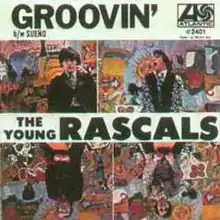Groovin'
"Groovin" is a single released in 1967 by the Young Rascals that became a number-one hit and one of the group's signature songs. It has been covered by many artists, including the Young Rascals themselves in other languages. A slightly different version was later released on their third studio album, Groovin'.
| "Groovin'" | ||||
|---|---|---|---|---|
 | ||||
| Single by The Young Rascals | ||||
| from the album Groovin' | ||||
| B-side | "Sueño" | |||
| Released | April 10, 1967 | |||
| Recorded | March 27, 1967 | |||
| Genre | R&B, blue-eyed soul[1] | |||
| Length | 2:30 | |||
| Label | Atlantic | |||
| Songwriter(s) | Felix Cavaliere Eddie Brigati | |||
| Producer(s) | The Rascals | |||
| The Young Rascals singles chronology | ||||
| ||||
| "Groovin'" | |
|---|---|
| Single by Booker T & the M.G.s | |
| from the album Hip Hug-Her | |
| Released | 1967 |
| Genre | R&B, soul |
| Length | 2:40 |
| Label | Stax Records 224 |
| Songwriter(s) | Felix Cavaliere Eddie Brigati |
Written by group members Felix Cavaliere and Eddie Brigati and with a lead vocal from Cavaliere, it is a slow, relaxed groove, based on Cavaliere's newfound interest in Afro-Cuban music. The instrumentation of the song includes a conga, a Cuban-influenced bass guitar line from session musician Chuck Rainey, and a harmonica part, performed first for the single version by New York session musician Michael Weinstein, and later for the album version by Gene Cornish.
Background
"Groovin" was inspired by Cavaliere's then-girlfriend, Adrienne Buccheri. He said of her, "I believe she was divinely sent for the purpose of inspiring my creativity."[2] Lyrically, "Groovin'" is the evocation of a person in love:
- Life would be ecstasy, you and me endlessly ...
- Groovin' ... on a Sunday afternoon
- Really couldn't get away too soon —[1]
Cavaliere wrote the music for the song, and he and Eddie Brigati collaborated on the lyrics. The basic track was recorded by Cavaliere on vocals and piano, with Dino Danelli playing conga and woodblock and Gene Cornish on tambourine. Background vocals by Eddie and David Brigati were added later. Bass was added by Chuck Rainey, and occasional session musician Michael Weinstein provided the harmonica. The production was supervised by Arif Mardin.[3]
The song is fairly different from the Rascals' white soul origins, enough so that Atlantic Records head Jerry Wexler did not want to release the single. Cavaliere credits disc jockey Murray the K with intervening to encourage Atlantic to release the song: "To tell you the truth, they didn't originally like the record because it had no drum on it...We had just cut it, and [Murray the K] came in the studio to say hello. After he heard the song, he said, 'Man, this is a smash.' So, when he later heard that Atlantic didn't want to put it out, he went to see Jerry Wexler and said, 'Are you crazy? This is a friggin' No. 1 record.' He was right, because it eventually became No. 1 for four straight weeks."[4]
The single became an instant hit in May 1967, spending four nonconsecutive weeks atop the Billboard pop singles chart. The weeks were interrupted by Aretha Franklin's cover of "Respect", which spent two weeks at No. 1 in the middle of "Groovin'"'s run. Interestingly, Franklin would later cover "Groovin'" for her album Lady Soul. The song also reached No. 3 on the Billboard Black Songs chart.[5] "Groovin'" was the only hit the group ever had in the United Kingdom, reaching No. 8 on the UK Singles Chart. After the fourth week, "Groovin'" dropped from the charts; Casey Kasem remarked on it in his radio show American Top 40 five years later.[6]
The song was an RIAA-certified gold record on June 13, 1967. Due to its massive popularity, the track was included on the Young Rascals' late July 1967 album of the same name, albeit with an alternate harmonica solo by Cornish on the stereo version.

"Groovin'" is one of the Rock and Roll Hall of Fame's 500 Songs that Shaped Rock and Roll, and is also the recipient of a Grammy Hall of Fame Award.
The phrase "you and me endlessly" was often misheard as the mondegreen "you and me and Leslie".[7]
Chart performance
Weekly charts
|
Year-end charts
All-time charts
|
Cover versions
- Within weeks of the Young Rascals release, Booker T. and the M.G.'s recorded an instrumental cover of "Groovin'". Issued as a single, the track reached No. 21 on the pop charts, No. 10 on the US R&B charts, and No. 4 on the Canadian R&B chart[15] in the summer of 1967.
- The Young Rascals themselves recorded "Groovin" in Spanish,[16] French,[17] and Italian[18] in 1968.
- A cover by War reached No. 30 on the U.S. Billboard Adult Contemporary chart in the spring of 1985[19] and No. 79 on the Billboard Hot Black Singles chart.
- In 1996, Pato Banton recorded a version with the Reggae Revolution that reached number 14 on the UK Singles Chart in July.[20] The next month, the cover became a major hit in New Zealand, reaching number four on the RIANZ Singles Chart and staying in the top 20 for nine weeks.[21] It was the country's 47th best-selling single of the year[22] and received a Gold sales certification for selling over 5,000 copies.[23]
References
- Gilliland, John (1969). "Show 52 - The Soul Reformation: Phase three, soul music at the summit. [Part 8]" (audio). Pop Chronicles. University of North Texas Libraries. Track 5.
- Joyce Pellino Crane (2003-06-10). "A Groovin' Reunion With A Rascal - And A Hero". The Boston Globe. Retrieved 2015-05-15.
- Myers, Marc (2016). Anatomy of a Song. Grove Press. pp. 87–91. ISBN 978-1-61185-525-8.
- Cohen, Elliot Stephen. "Felix Cavaliere traces the tumultuous history of The Rascals > Review". Goldmine. Retrieved December 21, 2011.
- Whitburn, Joel (2004). Top R&B/Hip-Hop Singles: 1942-2004. Record Research. p. 482.
- The drop was 1-2-9-38-off, but Kasem erroneously said 1-2-9-35-off instead on American Top 40 for the week ending 18 November 1972. The three-week drop and then off was tied in 1974 by Billy Preston's "Nothing from Nothing", which fell 1-15-39-72-off, and Andy Kim's "Rock Me Gently", which fell 1-12-32-48-off, and in 1975 by Freddy Fender's "Before the Next Teardrop Falls", which fell 1-7-19-44-off.
- Marc Myers (2013-04-04). "The Day They Grooved to ' Groovin' '". The Wall Street Journal. Retrieved 2014-11-16.
- "flavour of new zealand - search listener". Flavourofnz.co.nz. Retrieved 2016-09-30.
- "SA Charts 1965–March 1989". Retrieved 5 September 2018.
- "Top 100 1967". top-source.info. Retrieved 17 June 2016.
- Joel Whitburn's Top Pop Singles 1955–2002
- "Item Display - RPM - Library and Archives Canada". Collectionscanada.gc.ca. Archived from the original on 2016-08-12. Retrieved 2016-09-30.
- "Top 100 Hits of 1967/Top 100 Songs of 1967". Musicoutfitters.com. Retrieved 2016-09-30.
- "Billboard Hot 100 60th Anniversary Interactive Chart". Billboard. Retrieved 10 December 2018.
- "Item Display – RPM – Library and Archives Canada". Collectionscanada.gc.ca. September 23, 1967. Retrieved September 12, 2019.
- "Groovin' (Spanish Version) - The Young Rascals". YouTube. 2010-01-03. Retrieved 2016-09-30.
- "Young Rascals Groovin' French Version (Rare)". YouTube. 2014-05-08. Retrieved 2016-09-30.
- "Groovin' (Italian Version) The Young Rascals". YouTube. 2009-11-27. Retrieved 2016-09-30.
- Whitburn, Joel (1993). Top Adult Contemporary: 1961-1993. Record Research. p. 250.
- "Official Singles Chart Top 100 21 July 1996 – 27 July 1996". Official Charts Company. Retrieved October 27, 2018.
- "Pato Banton & The Reggae Revolution – Groovin' (song)". charts.nz. Retrieved October 27, 2018.
- "End of Year Charts 1996". Recorded Music NZ. Retrieved October 27, 2018.
- "Official Top 40 Singles – 6 October 1996". Recorded Music NZ. Retrieved November 19, 2019.